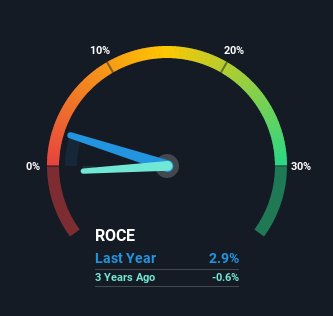- Saudi Arabia
- /
- Basic Materials
- /
- SASE:3020
The Returns On Capital At Yamama Saudi Cement (TADAWUL:3020) Don't Inspire Confidence

What trends should we look for it we want to identify stocks that can multiply in value over the long term? Typically, we'll want to notice a trend of growing return on capital employed (ROCE) and alongside that, an expanding base of capital employed. This shows us that it's a compounding machine, able to continually reinvest its earnings back into the business and generate higher returns. Having said that, from a first glance at Yamama Saudi Cement (TADAWUL:3020) we aren't jumping out of our chairs at how returns are trending, but let's have a deeper look.
Understanding Return On Capital Employed (ROCE)
For those who don't know, ROCE is a measure of a company's yearly pre-tax profit (its return), relative to the capital employed in the business. The formula for this calculation on Yamama Saudi Cement is:
Return on Capital Employed = Earnings Before Interest and Tax (EBIT) ÷ (Total Assets - Current Liabilities)
0.029 = ر.س164m ÷ (ر.س5.9b - ر.س344m) (Based on the trailing twelve months to December 2021).
Therefore, Yamama Saudi Cement has an ROCE of 2.9%. In absolute terms, that's a low return and it also under-performs the Basic Materials industry average of 8.9%.
See our latest analysis for Yamama Saudi Cement

In the above chart we have measured Yamama Saudi Cement's prior ROCE against its prior performance, but the future is arguably more important. If you'd like, you can check out the forecasts from the analysts covering Yamama Saudi Cement here for free.
The Trend Of ROCE
On the surface, the trend of ROCE at Yamama Saudi Cement doesn't inspire confidence. Over the last five years, returns on capital have decreased to 2.9% from 12% five years ago. And considering revenue has dropped while employing more capital, we'd be cautious. If this were to continue, you might be looking at a company that is trying to reinvest for growth but is actually losing market share since sales haven't increased.
In Conclusion...
From the above analysis, we find it rather worrisome that returns on capital and sales for Yamama Saudi Cement have fallen, meanwhile the business is employing more capital than it was five years ago. Yet despite these concerning fundamentals, the stock has performed strongly with a 59% return over the last five years, so investors appear very optimistic. Regardless, we don't feel too comfortable with the fundamentals so we'd be steering clear of this stock for now.
Like most companies, Yamama Saudi Cement does come with some risks, and we've found 1 warning sign that you should be aware of.
While Yamama Saudi Cement may not currently earn the highest returns, we've compiled a list of companies that currently earn more than 25% return on equity. Check out this free list here.
New: Manage All Your Stock Portfolios in One Place
We've created the ultimate portfolio companion for stock investors, and it's free.
• Connect an unlimited number of Portfolios and see your total in one currency
• Be alerted to new Warning Signs or Risks via email or mobile
• Track the Fair Value of your stocks
Have feedback on this article? Concerned about the content? Get in touch with us directly. Alternatively, email editorial-team (at) simplywallst.com.
This article by Simply Wall St is general in nature. We provide commentary based on historical data and analyst forecasts only using an unbiased methodology and our articles are not intended to be financial advice. It does not constitute a recommendation to buy or sell any stock, and does not take account of your objectives, or your financial situation. We aim to bring you long-term focused analysis driven by fundamental data. Note that our analysis may not factor in the latest price-sensitive company announcements or qualitative material. Simply Wall St has no position in any stocks mentioned.
About SASE:3020
YAMAMA Cement
Engages in the manufacture, production, and trading of cement in Saudi Arabia.
Undervalued with solid track record.
Similar Companies
Market Insights
Community Narratives



